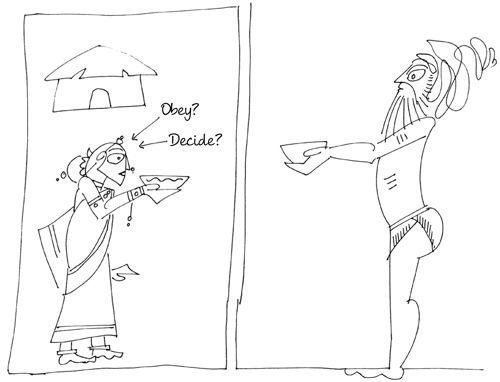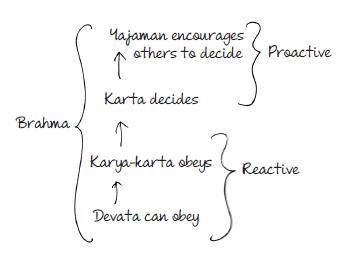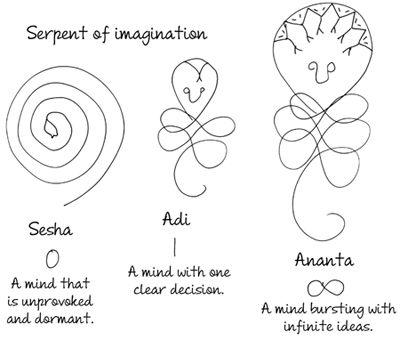Read Business Sutra: A Very Indian Approach to Management Online
Authors: Devdutt Pattanaik
Business Sutra: A Very Indian Approach to Management (17 page)
It is the fear of starvation and the quest for food that makes animals mark territories and organize themselves into pecking orders where the strongest animal in the pack, the alpha, dominates and so gets the most food, increasing his chances of survival, while the weakest, the omega, survives on the leftovers, often turning into food for another predator. It is hunger that makes animals compete.
Humans reject the way of the jungle. Imagination allows Brahma to seek maximum food even if he is weak and powerless. From imagination comes the vision of a world where the helpless are helped and even the unfit can thrive. And so he creates the pot.
While animals have to go to a water body to quench their thirst, humans can drink water whenever and wherever they wish, and give it to whomever they want, thanks to the pot. The pot represents the human capability to innovate. It enables humanity to break free from the constraints of nature.
Lakshmi holds a lotus in one hand and a pot in the other. The lotus represents natural wealth or Bhudevi while the pot represents cultural wealth or Shridevi. The nectar of the lotus is available to whichever bee gets to it first. The contents of the pot, however, are available only to the owner of the pot and to whomsoever the pot is bequeathed. This can never happen in nature. This can only happen in sanskriti.
In Jain mythology, a yajaman who makes pots to convert Bhudevi to Shridevi walks the path of the vasudev, which literally translates to mean 'master of the earth and the elements'. Vasudev is shalaka-purush, a worthy being, an action-driven hero who fights on behalf of his pacifist brother—the baladev—a victim of the prati-vasudev, or the villain.
- Vasudev takes decisions and makes things happen, taking full responsibility for the consequences.
- He knows that without violence the wealth of the earth cannot be drawn out.
- He knows that things need not be done nastily; there is always a nice way to do things.
- He knows how to churn, pull and push, adapt, transform the rigid organization into a nimble organism.
In this chapter, we shall explore decisions, violence, seduction and churning and by doing so appreciate the vasudev's gaze. A yajaman who possesses drishti and seeks Lakshmi, walks the path of the vasudev. A vasudev's gaze is that of the passionate entrepreneur who appreciates the elusive nature of wealth.
Mandeep can see an opportunity. The new bus stop will attract a lot of people. And people need tea and snacks. Opening a tea stall next to the bus stop will allow him to be independent. He has slaved at a tea stall in the station for years and knows what it takes to run such an enterprise. All he needs is some money and the support of local authorities. He will need to charm a few people for capital, seek favours from others and force his way to realize his dream. His boss will not be supportive but if he gets the backing of the local don, no one can stop him. The police may harass him, but even they need tea. Mandeep is a vasudev, unafraid of a fight, determined to create the pot that will harness Lakshmi.
Decisions
Key to the yagna is the decision: the willingness to pour svaha into the fire. Once poured, it cannot be pulled back. Not everyone takes decisions. Few want to be responsible for the escalating cost and the unpredictable consequences of an investment. Humans are the only living creatures who can, and do, outsource decision-making.
He who takes a call is a karta
In the epic Ramayan, Sita finds herself in a predicament. She is alone in the middle of the forest. Her husband, Ram, and brother-in-law, Lakshman, are away on a hunt. A line has been drawn around her hut. She has been told very clearly that only within the line do the laws of culture apply; here she is Ram's wife. Outside is nature, where the rules of marriage make no sense; she is just a woman for the taking.
A hermit standing outside the line asks for some food. She invites him in but he refuses explaining that as she is alone it would be inappropriate for him to enter. She stretches her hand over the line and offers him food. This annoys the hermit. He demands she step outside and feed him properly.
Must she or must she not? If she does step out, she brings her family honour by being a good host, but she takes a huge risk as she makes herself vulnerable. If she does not, she protects herself but condemns a hermit to hunger. What matters more: hospitality or security?
Sita steps out.
Had she obeyed her husband without any thought, she would have been the karya-karta, or the obedient follower, and he the karta, or the responsible leader. But the instructions were given to her in a context very different from the one she encountered; there was no hungry hermit then. Now a hungry hermit stood outside the hut; would Ram have allowed a hermit to starve to secure his wife?
Sita chooses to take a call. She is not obliged to, yet she takes the responsibility upon herself. That proactivity transforms her into a karta, a doer, regardless of the fact that her decision did not serve her well. The hermit turns out to be the rakshasa-king, Ravan, who abducts her.
To build a business, we need decision-makers and decision-followers. He who takes decisions is the karta. He who follows decisions is called a karya-karta.

After the interview, Mahmood asks Rajiv, the head of his human resource department, to stay back. They are about to select the Chief Operating Officer for the telecom division of the business. Mahmood is anxious. It is a huge risk, hiring a foreigner with no experience of India. To retain him, they have to assure him a golden parachute: compensation should the company terminate the contract before the stipulated three years. But Hugh, who has been selected, has knowledge the company desperately needs. "Will it work?" Mahmood asks. Rajiv keeps quiet. There are no guarantees. Only time will tell. Ultimately, the boss has to decide. Rajiv will diligently obey. Mahmood is the karta and Rajiv is the karya-karta.
Every one is a potential karta
The mind of every human being can be compared to the mythic serpent Adi-Ananta-Sesha whose name translated literally means One-Infinity-Zero. Narayan sleeps in the coils of this serpent. Vishnu sits on it. Sesha, the coiled hoodless state, is like a dormant mind that does not think or take a decision. Ananta, the state with infinite unfurled hoods, is like a mind full of ideas. Adi, the state with a single hood, is like a focused mind, ready to strike; this is the mind of the karta.
Animals take decisions all the time. Only humans have the option not to take decisions. We can outsource decision-making to the karta and stay a karya-karta. We may even choose not to follow the decisions of a karta, like an impudent devata who needs to be cajoled or forced into action. When we choose to help others take decisions, we transform into yajamans. A yajaman is a karta too; but all kartas are not yajamans.
Thus humans have a choice to be proactive like a decision-making karta or a decision-enabling yajaman. We also have a choice to be reactive like a decision-following karya-karta or a reluctant devata.
We can let the serpent of the mind stay coiled or spring out its many hoods. Only we can make it strike.


When the customer walks into the shop and Babulal does not engage with him, it is the Sesha state of slumber when no exchange take place. When the customer makes a request and Babulal reacts immediately; thus does Sesha turn into Adi. Babulal can return to the Sesha state or stir Ananta in the customer by a simple question, "Anything else you wish to buy?" This one question provokes thoughts and ideas in the customers' mind, infinite ideas are unfurled, and there is a possibility of more business.
A karta who allows and enables others to take a call is a yajaman
One day, the sage Narad asks Vishnu, with a bit of hesitation, "Why do you insist that the image of Garud be placed before you in your temples? Why not me? Am I not your greatest devotee?"
Before Vishnu can reply a crash is heard outside the main gate of Vaikuntha. "What was that?" asks Vishnu. Garud, Vishnu's eagle and vehicle, who usually investigates such events, is nowhere to be seen. "I have sent Garud on an errand. Can you find out what happened, Narad?" asks Vishnu. Eager to please Vishnu, Narad runs out to investigate. "A milkmaid tripped and fell," he says when he returns.
"What was her name?" asks Vishnu. Narad runs out, speaks to the maid and returns with the answer, "Sharda."
"Where was she going?" asks Vishnu. Narad runs out once again, speaks to the maid and returned with the answer, "She was on her way to the market."
"What caused her to trip?" asks Vishnu. "Why did you not ask this question the last time I went?" mumbles Narad irritably. He then runs out, speaks to the maid once again. "She was startled by a serpent that crossed her path," he says on his return. "Anything else?" he asks.
"Are all her pots broken?" asks Vishnu. "I don't know," snaps Narad. "Find out," insists Vishnu. "Why?" asks Narad. "Find out, Narad. Maybe I would like to buy some milk," says Vishnu patiently. With great reluctance, Narad steps out of Vaikuntha and meets the milkmaid. He returns looking rather pleased, "She broke one pot. But there is another one intact. And she is willing to sell the milk but at double price."
"So how much should I pay her?" asks Vishnu. "Oh, I forgot to ask. I am so sorry," says Narad running out once again. "Do not bother. Let me send someone else," says Vishnu.
Just then, Garud flies in. He has no idea of what has transpired between Vishnu and Narad. Vishnu tells Garud, "I heard a crashing sound outside the main gate. Can you find out what happened?" As Garud leaves, Vishnu whispers, "Let us see how he fares."
Garud returns and says, "It is a milkmaid called Sharda. She was on her way to the market. On the way, a snake crossed her path. Startled she fell down and broke one of the two pots of milk she was carrying. Now she wonders how she will make enough money to pay for the broken pot and the spilt milk. I suggested she sell the milk to you. After all, you are married to Lakshmi, the goddess of wealth."
"And the price of the milk?" asks Vishnu. Pat comes Garud's reply, "Four copper coins. One actually but I think she hopes to make a handsome profit when dealing with God." Vishnu starts to laugh. Garud always anticipates situations and takes calls accordingly without checking with his boss or master. In that micro-context, he behaves as karta.
Vishnu's eye caught Narad's and Narad understood in that instant why Garud's statue, and not his was always placed before the image of Vishnu in Vishnu temples.
Despite being given the freedom to take decisions, Narad chooses to stay karya-karta, follow decisions rather than take them, as he is too afraid of the consequences. Garud, on the other hand, anticipates the needs of Vishnu, decides to enquire voluntarily and is thus a karta. Vishnu who allows Garud to be a karta is a yajaman.
Arindam realizes the value of Meena as a team member over Ralph. Both are good workers. But when Arindam has to go for a meeting with Meena, she gives him a file with all relevant details about the client so that he can prepare well. Ralph will do no such thing. When Arindam points this out, Ralph says, "Is that the process? Do you want me to do that? I will do that, no problem." Arindam realizes that Ralph is no Garud.